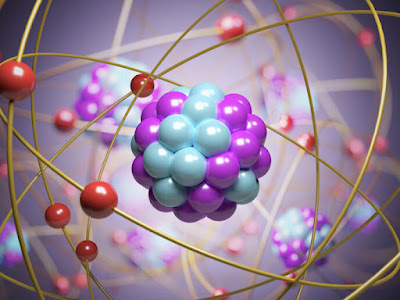Unveiling the Secrets of Atoms: Exploring the Building Blocks of Matter
Fig; 2
Atoms are the building blocks of matter, and everything around us is made up of atoms. They are the basic units of chemical elements, and are composed of subatomic particles: protons, neutrons, and electrons. Protons and neutrons are found in the nucleus, which is located at the center of the atom, while electrons orbit the nucleus in shells or energy levels. The number of protons in an atom's nucleus is what determines its identity as a specific element. For example, an atom with six protons is a carbon atom, while an atom with eight protons is an oxygen atom. The number of neutrons in the nucleus can vary, giving rise to different isotopes of the same element. Isotopes have the same number of protons but different numbers of neutrons, which affects their properties and behavior. Electrons are negatively charged particles that are attracted to the positively charged protons in the nucleus. The electrons occupy different energy levels or shells around the nucleus, with the innermost shell closest to the nucleus and the outermost shell furthest away. The number of electrons in the outermost shell determines the atom's chemical properties and how it will interact with other atoms. Atoms can gain or lose electrons to form ions, which are charged particles. If an atom loses one or more electrons, it becomes a positively charged ion, while if it gains electrons, it becomes a negatively charged ion. Ions can then interact with other ions or neutral atoms to form chemical compounds. The study of atoms and their behavior falls under the branch of physics known as atomic physics. Atomic physicists use various experimental and theoretical methods to study the properties and behavior of atoms, including spectroscopy, which involves analyzing the interaction between light and matter. In conclusion, atoms are the fundamental units of matter, and the study of their behavior is an important area of physics research. Understanding how atoms interact and combine to form different compounds is crucial to many scientific and technological fields, including chemistry, materials science, and engineering.
Submit Your Conference Abstract: https://x-i.me/hepconSubmit Your Award Nomination: https://x-i.me/hepnom
Get Connected Here:
==================Facebook : https://x-i.me/yHa5Twitter : https://twitter.com/PsciencefatherPinterest : https://in.pinterest.com/victoriaanisa1/Instagram : https://www.instagram.com/victoriaanisa1/
#neutrinos #particlephysics #astrophysics #subatomicparticles #science #physics #cosmicrays #darkmatter #supernovae #nucleosynthesis #particleaccelerators #particle #detectors #standardmodel #fundamentalparticles #quantummechanics #weakforce #cosmicmessengers #neutrinooscillation





Comments
Post a Comment